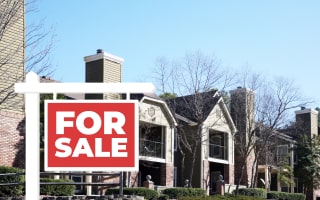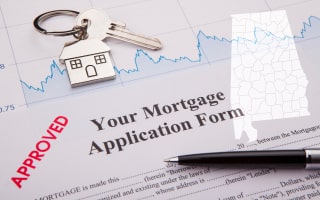Home Buying in Alabama

Alabama, the Heart of Dixie, is a verdant green state where deeply rural roots contrast with modern manufacturing plants, universities, and a NASA research facility. The variety of urban and rural settings provides home buyers with many choices.
The state's slow population growth rate of 0.5 percent and low median home price of $202,000, 41st in the country, makes Alabama real estate a buyer's market. When making Alabama home, it's important to understand the process of finding, financing, and buying your residence. With the right team, including a realtor, inspector, mortgage rep, and title company, the process can go smoothly.
Buying a Home in Alabama
If you are bringing a family to the state, you may want to examine school achievement scores and visit campuses near your desired location, while those of retirement age may want to get acquainted with options for public transit and medical facilities. But that's not all you need to do before home shopping. You need to get your financial house in order, too.
Buyers are expected to make a down payment of 10 to 20 percent on home purchases. Fortunately, Alabama's low average home price means a smaller-than-average down payment of about $20,000. It can take a while to accumulate that kind of cash when the state's median income is $59,000, but gathering a full 20 percent down payment actually saves money in the long term.
If you're strapped for cash or need to juggle your available funds to cover closing costs as well, you may want to look into programs for first-time buyers or other financial assistance programs designed to aid people in buying homes.
Qualifying for a mortgage also means your credit score must be at an acceptable level, usually 600 or higher. The size of your down payment can hinge on your credit score. If your down payment is higher than 10 percent, your credit score can be a little lower.
One thing lenders look for is financial responsibility and reliability. If you've had car loans or student loans, your record of repayment sets the stage for future borrowing. Late or missed payments make it difficult to find a lender willing to take a chance on you. Your repayment history is 35 percent of your credit score; the amount you owe is another 30 percent. So, if your income-to-debt ratio is reasonable and your payments are on time, your credit score will improve.
You can dream big in Alabama because prices are low. But before you jump in over your head, consider the long-term carrying costs of a large home or several acres of land. Homes do not appreciate as quickly in Alabama as in other states, so your investment in a property is unlikely to grow significantly in a decade.
Finding the Right Home

The average commute time in Alabama is about 25 minutes, and most people want a home that minimizes travel time. Aside from that, what's the most important feature of the community you want to live in: is it near schools or near shopping? Perhaps a quiet country setting is important to you.
The majority of Alabama's 67 counties are considered rural, which makes researching a potential home there very different from the considerations for an urban home.
In rural areas, purchasing considerations include:
-
How the land will be used
-
Taxes on large tracts of land
-
Travel time/distance to work and necessities
-
Distance from emergency services
-
Maintenance requirements for a large plot of land
In urban areas, considerations include:
-
Crime
-
Additional taxes (property, sales)
-
Whether a vehicle is necessary
-
If the neighborhood is friendly
What is the Typical Home Buying Process in Alabama
Finding the right real estate agent can be as important as finding the right doctor. You want an intuitive person who asks the right questions and can narrow your search quickly. A good realtor will point out the pros and cons of each property and help guide you to a seamless experience with qualified inspectors and title researchers. Read reviews of agencies and individual agents before committing to one and ask friends and colleagues for recommendations.
An Accredited Buyer's Representative (ABR) is trained to help home buyers. A new law requires buyer's agents to be more transparent about the fees they collect for their services and sign a contract with the home buyers that discloses their role and payment. Instead of splitting a 5-6 percent commission on the sale, buyer's agents must now negotiate their commission with the buyer. The commission can be written into the purchase offer, making it part of the sale price.
Once you have a realtor on your team, additional steps in buying a home are:
-
Prequalifying for a mortgage
-
Making an offer
-
Making a down payment
-
Getting the property inspected
-
Having the deed researched
-
Closing the deal
Financing Your Home Purchase

Homes in Alabama are affordable relative to high prices elsewhere, yet a mortgage may be the best option for financing as tax breaks for mortgage interest deductions can be beneficial.
Your longtime bank is a good starting place when shopping for a home loan or mortgage, but you don't have to accept the terms they offer. You may also consult a mortgage broker, who will shop all types of mortgages for the best rates and terms available with your credit score and down payment.
If you have a high credit score, you may qualify for a lower down payment, but if the down payment is less than 20 percent, you will be required to buy mortgage insurance. Fixed-rate and adjustable-rate mortgages are based on the federal interest rate at the time the loan is made. Fixed rates are great if interest rates are low but less desirable if rates are high (and could potentially drop). Adjustable-rate mortgages are riskier because the interest rate changes throughout the term of the loan.
Government-backed mortgages include:
- FHA mortgages, which are tailored for first-time buyers with down payments of less than 5 percent.
- USDA loans and mortgages have below-market interest rates and low-down-payment requirements and are available for suburban and rural home buyers whose income is no more than 115 percent of the area median. In Alabama, that's up to about $110,000 for two people.
- VA loans that are available to military veterans, including special rates and favorable terms.
Home Insurance

Your mortgage company may require homeowner’s insurance and mortgage insurance to protect its interest in the property. In Alabama, property insurance is not required for homeowners.
When buying a home, consider the types of insurance you may need to ensure coverage. Floods and damage from wind or storms (tornadoes or hurricanes) may not be included unless specifically listed in the policy.
Buildings and structures other than the primary dwelling unit, such as a barn, fences, or garage, may require additional insurance.
Home Buying Challenges
Finding a home is the biggest challenge to prospective buyers in Alabama. The number of new homes constructed in the country in recent years has declined, and interest rates are high, which discourages residents from selling.
The average age of a home in Alabama is over 40, and the total number of homes on the market in the state has declined in the past few years. Even with a low number of people moving into the state, the inventory of available homes is low, and older homes are less appealing to buyers.
In addition, contractors and tradesmen are in short supply across the country, making purchasing an inexpensive fixer-upper home a big challenge if buyers choose that route.
Alabama Home Inspections
Alabama has a mix of weather types, including tornadoes, severe thunderstorms, lightning, extreme cold, flooding, and ice storms. These types of weather can severely damage a house. Alabama home inspections are crucial because the state operates on a "caveat emptor" system, meaning buyers are responsible for uncovering property defects. The home inspection can help uncover any hidden defects or faulty systems before buying.
A home inspection in Alabama is a visual inspection of the entire property, looking for damage, faulty equipment, improper installations, and potential issues. The inspector examines the condition of structural elements, major systems, appliances, and safety features. Some of the items included are:
-
Foundation: Looking for any cracks, settling, or structural integrity issues.
-
Roof: Checks the shingles, flashing, vents, gutters, and chimneys.
-
Exterior: Checks the siding, windows, doors, drainage, paint, and functioning lights and outlets.
-
Attic/Basement: Checks the attic and basement for insulation, water damage, pest infestations, and ventilation.
-
Interior: Checks walls, ceilings, doors, windows, and stairs for signs of wear and tear, damage, and general upkeep.
-
Heating/Cooling: Evaluates the age and condition of heating and cooling systems, ductwork, ventilation, and performance.
-
Plumbing: Inspects pipes, drains, fixtures (sinks, toilets, tubs, showers, faucets), and water pressure.
-
Electrical: Assesses the condition of electrical wiring, circuit breakers, light fixtures, outlets, and fans.
A home inspection in Alabama costs between $300 and $500, depending on the size of the home and any additional tests needed, such as radon, mold, and pests. The average cost of a home inspection in Huntsville, AL is $300-$500.
The Process
In Alabama, buyers usually pay for home inspections because they benefit the most. Rarely, a seller may have a pre-listing inspection to ensure no problems with the sale. The process of an Alabama home inspection is as follows:
- Find a good, solid, reputable home inspection company.
- Schedule the inspection as quickly as possible after signing the contract.
- Show up and stay for the entire inspection. You can ask questions during the process, which usually takes two to four hours.
- Review the final report and decide what to do next.
The top five home inspection companies in Alabama are:
- House Call Home Inspection - Huntsville, AL
- Birmingham Home Inspectors - Birmingham, AL
- Pillar to Post Home Inspections - Birmingham, AL
- National Property Inspectors - Birmingham, AL
- Griffith Home Analysis - Birmingham, AL
After the Inspection
Once the inspector completes the evaluation, they will take a few days to compile their findings. They will issue the report to the buyer and other interested parties. The buyer then has a decision about what to do with the information. If the inspector finds things that could be costly to fix or replace, the buyer can:
- Saving money by negotiating a better price on the house.
- Ask the seller to fix everything before closing.
- Request a home warranty.
- Ask to put down a smaller down payment.
- Back out of the deal altogether.
Inspection Top Cities
| City | Inspection Cost | Local Issues | Local Rules | Local Home Types |
|---|---|---|---|---|
| Home Inspection in Huntsville | $300-$500 depending on the size of the home and additional services like termite, mold, or radon tests. | Roof, HVAC, wiring, structural issues, and drainage. | Requires a licensed home inspector. | Single-family, townhouses, and condos. |
| Home Inspection in Birmingham | $325-$575 based on the home's size and any additional tests needed. | Grading, drainage, wiring, roof, and plumbing. | No specific city-mandated rules. | Craftsman, Tudor, and Colonial Revival. |
| Home Inspection in Montgomery | $300-$500 based on home's size, age, and additional tests. | Roof damage, plumbing issues, electrical problems, and faulty HVAC systems. | Requires a licensed inspector and a written report for the buyer. | Single-family, townhouses, condos, and duplexes. |
| Home Inspection in Mobile | $325-$450 based on the size of the property and if the buyer needs other tests. | Roof, electrical wiring, plumbing, HVAC, and foundation. | Governed by the Alabama Division of Construction Management and must follow local building codes. Inspectors must be licensed. | Single-family homes, condos, townhouses, multi-family homes, and land. |
| Home Inspection in Tuscaloosa | $300-$500 based on the size of the property and additional tests ordered. | Roof, electrical, HVAC, and foundation. | Inspectors must be licensed and provide proof of liability insurance. | Historic homes, modern suburban properties, and rural estates. |
Instant Access to Alabama Property Records
- Owner(s)
- Deed Records
- Loans & Liens
- Values
- Taxes
- Building Permits
- Purchase History
- Property Details
- And More!